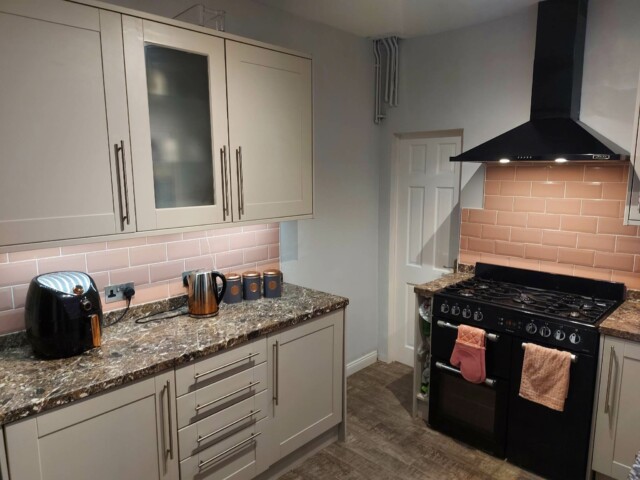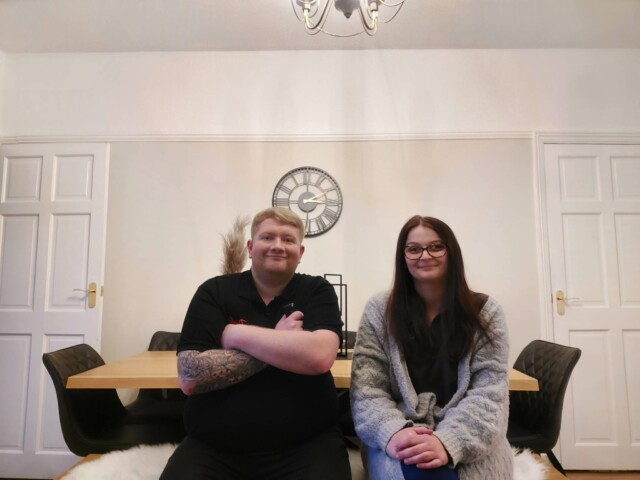FIRST-TIME buyers Ella and Thomas challenged themselves to overhaul their finances to help save up a deposit for their first home.
Ella, 22 and her husband Thomas Tomlin, 28, put almost half of their monthly salaries into a savings account to buy their first home.
Ella and Thomas bought their first home in July 2022
The couple managed to save around half of their wages a month to buy the house
 They live in a four-bedroom terraced house in Leicestershire
They live in a four-bedroom terraced house in Leicestershire
The couple managed to save around between £1,500 and £2,000 a month and got their keys to their £235,000 first home in July 2022.
Like many other first-time buyers, the couple needed to rethink their spending to help save up cash for a deposit.
The couple lived with Ella’s parents and were lucky enough to not have to pay rent, which helped them to reach their goal quicker.
Ella made a spreadsheet so she could see all of their outgoings and divided the cash she needed to cover essentials.
The pair used the app-based bank Monzo and started to look at the free budgeting tools it offered.
Monzo lets you create different “pots” for your money so you can split your cash to be used for different outgoings.
Ella and Thomas made pots for essentials like phone bills, car insurance and food shopping.
The couple also had a locked pot where they put all of their savings.
On Monzo, you can lock a pot for a certain amount of time meaning there is less temptation to use the cash.
There are lots of other money apps like Monzo, including Snoop and Plum, that can help you to budget and save.
HOAR has put together a guide to the best money saving apps here.
Setting themselves the goal to move into their own place, Ella and Thomas made the most of their Lifetime Isa.
Anyone between the ages of 18 and 40 can open a Lifetime Isa to save for buying a first home.
Savers are able to withdraw money from their ISA if they are buying a home, over 60, or terminally ill with less than 12 months to live.
But you’ll pay a 25% charge if you withdraw money or transfer the Lifetime Isa to another type of Isa before the age of 60.
Ella put the maximum of £4,000 a year into her Isa, with the government paying an additional 25%.
Over four years, Lucia bagged a £4,000 bonus from the government to put towards her deposit.
While Thomas got a £2,000 bonus from putting away £8,000 over two years.
We sat down with Ella to discuss how she went from being a saver to a homeowner for HOAR’s My First Home series.
Tell me about your home
It’s a four-bedroom Victorian terraced house in Leicestershire.
We have a driveway and a garage at the back of the house which is really handy for a terrace.
Downstairs, we have a separate dining room, kitchen and louge.
There’s also a large bathroom downstairs, which is quite common for this type of house.
Upstairs, we have small bedrooms and a bathroom which is about the size of an en suite.
How did you decide on location?
We were living in the centre of Leicester but property prices are just too expensive there.
The house we moved into was actually the first ever house that we viewed and we put in an offer straight away.
The sellers originally went with a different buyer, but we got a call two days before our wedding to say that their sale had fallen through.
At that point, we had actually stopped looking for houses so it was a very welcome surprise.
How much did you pay for it?
The asking price was £225,000, but we went in £10,000 above, and the higher offer of £235,000 was accepted.
We saved a 15% deposit of around £33,000.
Our mortgage term is 25 years at a fixed rate of 2.4% for five years.
Our repayments are £860 a month, but we have decided to overpay and round this up to £900 a month.
We don’t notice the extra £40 a month leaving our account every month, but we know that it will make a difference in the long-term.
This will save us around £4,000 in interest over our mortgage term.
How did you save for it?
I made a spreadsheet
We first started saving during lockdown, but we put a plan in place to get a deposit together at the start of 2021.
The first thing I did was make a spreadsheet and put in all of our ingoings and outgoings.
We worked out that our monthly outgoings were around £1,200 a month for things like petrol, our phone bill, car insurance and food.
At the start of every month, this money would be divided up into different Monzo pots to make sure that it wasn’t spent.
For example, I would have a pot named “car insurance” and I would put the exact amount to cover the bill into it.
The rest of the money, which was between £1,500 and £2,000, would then go into a locked savings pot.
The amount would vary depending on if we had extra outgoings, like a car service, that month.
Putting the cash into a locked savings pot, that couldn’t be accessed for 48 hours, meant there was less temptation to dip into it.
We would also keep a couple of hundred pounds in our current account in case of an emergency, but anything left in this at the end of the month would then be sent straight to savings.
We saved half of our wages
Thomas and I were able to save the equivalent of one of our wages a month, which was helped hugely by the fact we were living with my parents.
This meant we weren’t having to for out for rent every month.
It was a huge saving, and there was no way we would have been able to save up so quickly if we weren’t living at home.
We didn’t have to pay rent and we just covered the cost of our food and all other outgoings.
Because of this, we could save between £1,500 and £2,000 a month depending on our other outgoings for 15 months from April 2021 to July 2022.
This worked out at around half of our monthly wage each.
I’m a trainee accountant and Thomas is a sales engineer and we are both basic rate tax payers.
We decided to do this after assessing our outgoings and finding it would be doable if we were strict with ourselves.
Thomas and I aren’t really big on going out anyway, so we didn’t have to cut back on anything or make sacrifices.
Keeping up with the spreadsheet and Monzo definitely helped us to keep on track.
Free cash
Thomas and I both have a Lifetime Isa and we got thousands of pounds for free from the government.
I opened my account in 2018, and put away the maximum of £4,000 a year.
By the time we came to buy, I had £16,000 in the account and I got a £4,000 bonus from the government.
Thomas had his account for two years and also saved the £4,000 maximum in that time. This meant he got a £2,000 bonus.
Overall, we got £6,000 free cash to put towards our home.
We haggled on my bills
I’ve always been a bit of a savvy saver and I’m not afraid to ask for a better deal.
I switched my phone bill from O2, where I was paying £35 a month for a Sim-only deal.
By searching online, I found a better deal for just £7 – a saving of £28 a month.
Thomas managed to haggle with his car insurance company after spotting a better deal elsewhere.
He managed to get breakdown cover thrown in for free.
Helping hand
We got a few thousand pounds from Thomas’ godfather after he passed away.
It just gave us the extra boost we needed to reach our deposit.
Although the circumstances were very sad, we were lucky to get the help and we know that it’s not possible for everyone.
How did you afford to furnish it?
We saved a little more than we needed for a deposit to account for buying furniture for our home.
We bought things in stages to spread out the cost.
Facebook Marketplace was really useful for finding some good quality, second-hand furniture.
For example, we got an Italian leather sofa that was in really good condition for just £30.
We also waited to buy things to pop up in the sale, instead of buying them for full price.
I had my eye on a dining table set from Dunelm that was £900.
A few days later I spotted it in a flash sale with 50% off, so that was a saving of £450 straight away.
We also shopped for deals on Amazon Prime Day and hunted for smaller furniture items, like picture frames, in charity shops.
Overall, I think we managed to save around £1,000 on furnishing our home by being savvy about where we shopped.
What advice would you give to other first-time buyers?
Just make sure that you do your research.
I found it was really helpful to set up a separate email account just for things to do with the house sale.
This included everything from solicitor’s emails to insurance policies and guarantees for appliances.
When you move in, I would also recommend taking a box of things you’ll need straight away like bin bags, toilet rolls and a kettle.
Here’s how one buyer managed to rent and save for a home at the same time.
Free cash for home saving schemes can also help you get on the ladder faster.
Do you have a money problem that needs sorting? Get in touch by emailing [email protected]








